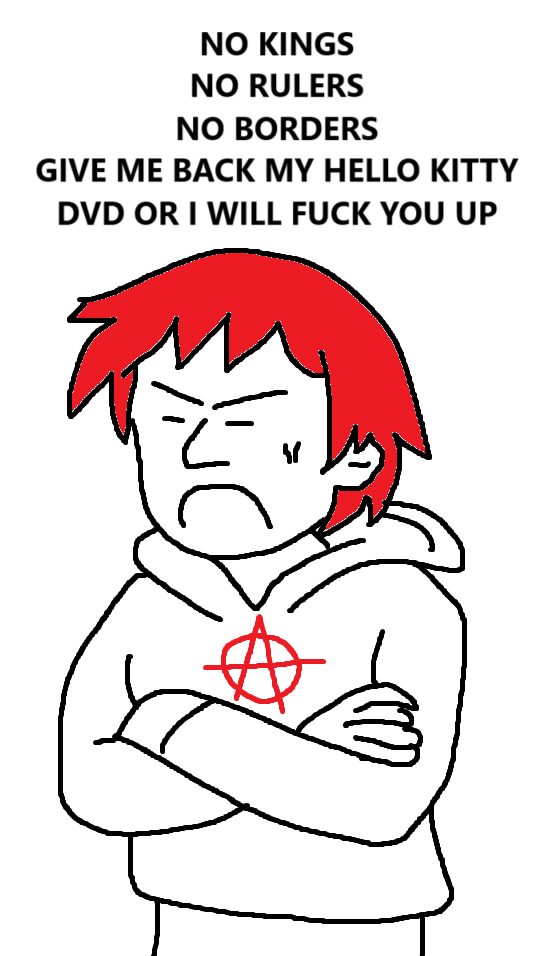[dude with glasses in a communist t-shirt, arguing] I’m the only leftist here, your opinions are TRASH
[dude holding a theory book on smug, arguing] Read theory you losers, you’re all WRONG
[dude in an anarchist hoodie, arguing] Nuh-uh, I’m the only leftist here, you’re SHITLIBS
[the three dudes are now caught in a cartoon fight, glasses gone flying, punches everywhere, while a firing squad of nazis are targeting them with rifles]
[a confused nazi asks] Why… why are they still arguing?



i think u misunderstand the delegate model i described.
what youre describing is a hierarchical system where the higher up the “rungs” u go, the larger the scope of decisions u can make.
whereas in the delegate model, the maximum scope of decisions is always directly with the people (who could make any decision independently of delegates, if they want to), and every delegate has decision-making power smaller than that scope, meaning the scope of possible actions decreases rather than increases.
Hierarchy isn’t something antihetical to socialism, it exists in all systems. Further, I still don’t really see how this model handles global systems of production and supply chains, and further still, I think you’re just redefining socialism to only include anarchism, which is a semantical argument and not a logical one.
as a communist, i believe there is such a thing as a non-hierarchical system.
further, i dont really see how the PRC will ever achieve communism or socialism and further still, i think you are redefining socialism to include china, which is a semantical argument and not a logical one.
Communism is generally held to be about class and state abolition, not hierarchy in general. Delegates in your model still have hierarchy, what’s important is accountability and that the general interest is upheld. As for the PRC, it’s already socialist, the large firms and key industries are publicly owned. It certainly isn’t anarchist, nor is it a stateless, classless, moneyless, global society, but it’s socialist.
which are hierarchies, and the criticism of these are based on the same root issue that all hierarchies have. i admit that this statement was somewhat inflammatory, altho i firmly believe that anarchism is the natural conclusion of the communist idea.
no. the power is always among the people who choose the delegate, formulate their mandate, and can recall them at any time. the delegate has no power over the people, nor is the delegate coerced into their role.
and u can call the PRC socialist all u like, but that still dont make it true.
Inter-class hierarchy exists, ie bourgeois and proletarian, but intra-class hierarchy also exists, ie worker and manager. The Marxist critique of class involves the fact that there’s hierarchy, but that’s not the focus, the focus is on class as a social relation to production as informed by ownership. I’m more than willing to agree that your critique is the general anarchist critique, and I’m okay with you preferring anarchism, I just think that if you’re trying to argue that Marxism isn’t a communist ideology because it doesn’t hold the same view of hierarchy as anarchism does, that that’s a bit myopic.
Just because the delegate was elected and is subject to recall doesn’t mean it isn’t a hierarchy, though. Unless your point is that the delegate can only do what 100% of those who elected them want, and if any oppose them then they have no power, but in that case everything would collapse to a halt. The PRC has delegates and elections, and recall elections too, so I’m not sure I understand your criticism with that.
As for not considering the PRC socialist, are you saying it doesn’t fit the anarchist conception of socialism, or the conception of socialism that includes Marxism as socialist? Ie, is your argument that the PRC does not meet the Marxist understanding of socialism as well as the anarchist? This is something that needs heavy judtification if so, but if you just mean the anarchist conception then I agree, the PRC isn’t anarchist and isn’t pretending to be.
ok this gotta be my last response bc i got better shit to do today.
so first off, i simply dont care what the marxist definition or critique of something is, so yes, please understand it as just the general anarchist critique.
well yes, if they want to stay a delegate they have to comply with the mandate they were given. i also understand that there may be practical considerations that lead ppl to choose weak (e.g. 95%) consensus decisions, and u can call that hierarchical if u like, but that doesnt mean we shouldnt strive to abolish all hierarchies.
the way u have described the PRC does not sound like they have delegates, rather representatives. ive already explained the difference.
as for considering the PRC state capitalist, this is my conception (altho i know a few marxists who agree), and so far ive only argued about the ownership situation and not touched upon wealth accumulation or markets at all, but i think ive still made a fair argument.
Well, up front, it’s nice that you at least cleared up that you don’t consider Marxism to be socialist. I disagree with that, of course, but now that we’ve established that your definition of socialism is exclusionary of Marxism, then that does at least mean we can have a consistent conversation.
As for delegates vs. representatives, the PRC’s democracy extends beyond simply voting for candidates and representatives. I already explained that each rung makes decisions for that which their area needs, and elect from among themselves delegates that they can recall. People’s integration into politics isn’t relegated to simple elections, but consensus building, feedback, drafts of policy, etc.
As for ownership, your argument was that politicians are literally owners of publicly owned industry, which isn’t how public ownership works anywhere. Even if the PRC is centrally planned for the majority of its large firms and key industries, that doesn’t mean those large firms and key industries are run for profit, personal enrichment of capitalists, participate in markets, etc. There’s nothing at all resembling capitalism there, so state capitalism is an absurdity. I gave clear examples of capitalist systems with heavy state involvement, like Singapore, that better fit “state capitalism.”
Either way, this will be my last comment too. Have a good one!
https://www.youtube.com/watch?v=Zc2q-82G6dg